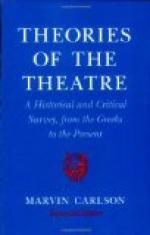It is, of course, true that the very greatest plays have always been great literature as well as great drama. The purely literary element—the final touch of style in dialogue—is the only sure antidote against the opium of time. Now that Aeschylus is no longer performed as a playwright, we read him as a poet. But, on the other hand, we should remember that the main reason why he is no longer played is that his dramas do not fit the modern theatre,—an edifice totally different in size and shape and physical appointments from that in which his pieces were devised to be presented. In his own day he was not so much read as a poet as applauded in the theatre as a playwright; and properly to appreciate his dramatic, rather than his literary, appeal, we must reconstruct in our imagination the conditions of the theatre in his day. The point is that his plays, though planned primarily as drama, have since been shifted over, by many generations of critics and literary students, into the adjacent province of poetry; and this shift of the critical point of view, which has insured the immortality of Aeschylus, has been made possible only by the literary merit of his dialogue. When a play, owing to altered physical conditions, is tossed out of the theatre, it will find a haven in the closet only if it be greatly written. From this fact we may derive the practical maxim that though a skilful playwright need not write greatly in order to secure the plaudits of his own generation, he must cultivate a literary excellence if he wishes to be remembered by posterity.
This much must be admitted concerning the ultimate importance of the literary element in the drama. But on the other hand it must be granted that many plays that stand very high as drama do not fall within the range of literature. A typical example is the famous melodrama by Dennery entitled The Two Orphans. This play has deservedly held the stage for nearly a century, and bids fair still to be applauded after the youngest critic has died. It is undeniably a very good play. It tells a thrilling story in a series of carefully graded theatric situations. It presents nearly a dozen acting parts which, though scarcely real as characters, are yet drawn with sufficient fidelity to fact to allow the performers to produce a striking illusion of reality during the two hours’ traffic of the stage. It is, to be sure—especially in the standard English translation—abominably written. One of the two orphans launches wide-eyed upon a soliloquy beginning, “Am I mad?... Do I dream?”; and such sentences as the following obtrude themselves upon the astounded ear,—“If you persist in persecuting me in this heartless manner, I shall inform the police.” Nothing, surely, could be further from literature. Yet thrill after thrill is conveyed, by visual means, through situations artfully contrived; and in the sheer excitement of the moment, the audience is made incapable of noticing the pompous mediocrity of the lines.




